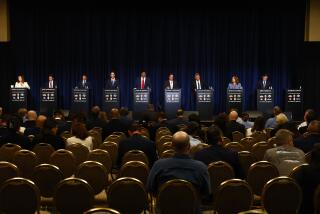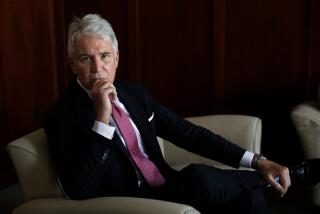Mukaseyâs crucial test: restoring Justice Dept.
WASHINGTON â With even Democrats expressing support for the nominee, the confirmation hearing today for Atty. Gen.-designate Michael B. Mukasey may seem short on drama.
Over his 40-year career, Mukasey, 66, has left a rich paper trail of work from which lawmakers can judge his fitness to serve, and the onetime prosecutor, private lawyer and federal judge is viewed by members of both parties as well-qualified.
âI like Judge Mukasey,â Sen. Patrick J. Leahy (D-Vt.), chairman of the judiciary committee, said Tuesday after meeting privately with the nominee for the second time since President Bush named him to replace Alberto R. Gonzales. âI want him to succeed.â
Still, Mukasey is facing some tough questions: How does he plan to restore morale at the Justice Department? Will he resist political pressure from the White House? Will he tell Bush if he believes the administration is veering into legally questionable terrain?
Though his confirmation appears a foregone conclusion, lawmakers and interest groups see the hearing as an opportunity to get commitments to clean up the Justice Department in the 15 months remaining of the Bush administration.
Here is a guide to some of the questions that Mukasey is likely to face and, regardless of how he answers, what legal experts say are his realistic options.
You are coming to an institution that has been engulfed in scandal. How do you plan to improve the competence, integrity and professionalism at the Justice Department?
The departure of Gonzales -- and a dozen or so subordinates -- has already improved morale. But Mukasey also faces problems in recruiting people for top leadership positions who would inspire the troops. Confidence would be shored up if he said that he had assurances from the White House to fill senior positions on his own or with limited involvement from administration political operatives.
But with the Bush administration winding down, he needs to move fast. A crucial vacancy is the head of the civil rights division, which has been especially battered by accusations of political interference. Observers say Mukasey would be smart to retain the acting deputy attorney general, Craig S. Morford, a respected career prosecutor, who has helped stabilize the department during Gonzalesâ final days.
The Justice Department is under investigation for allegations that Gonzales subordinates injected politics in hiring career prosecutors and in bringing voting fraud and public integrity cases. How do you plan to get to the bottom of these charges?
Though Mukasey could wait for the department inspector generalâs probe to run its course, a more aggressive move would be to name a special prosecutor to examine the charges, including allegations that the White House manipulated voting-rights and corruption cases to boost Republican candidates.
That would be a nightmare for the White House, still smarting from the departmentâs selection of a special prosecutor in the CIA leak case. Some believe it unlikely that Mukasey would make such a move, although unlike Gonzales, he is no friend of the president and would not allow personal considerations to interfere. A precedent: Janet Renoâs agreeing to the appointment of independent counsels to investigate Clinton-era scandals.
Congress has taken preliminary steps to hold several former White House officials, including counsel Harriet E. Miers and strategist Karl Rove, in contempt for failing to testify about the firing of nine U.S. attorneys. Would you allow the Justice Department to pursue contempt charges against them?
Under Gonzales, the Justice Department indicated that it would block such a move. The department ruled that the likes of Miers and Rove were protected by the principle of executive privilege, and thus were excused from testifying. Mukaseyâs position on the scope of executive privilege is unclear, although regardless of how he feels about prosecuting Rove or Miers, he is under pressure to broker some form of truce between Congress and the White House.
How much power does the president have to override federal law and international treaties without the involvement of Congress?
Bush administration officials, including Gonzales, have argued that the president has virtually unencumbered power during time of war to defend national security without consulting Congress. The aggressive view led to the warrantless surveillance of terrorism suspects after Sept. 11, 2001, and guidelines for interrogating terrorism suspects that were at odds with the Geneva Convention.
Mukasey is decidedly pro-government when it comes to national security matters, although not reflexively so. For example, he held that terrorism suspect Jose Padilla could be held as an enemy combatant -- but ruled that the government had to give him a lawyer. Many believe he is likely to say that the better course is for administration officials to work with lawmakers to implement more aggressive anti-terrorism measures.
The Justice Department has supported the use of aggressive interrogation techniques by the CIA. A 2005 legal opinion found that the use of head-slapping, extreme temperatures and a technique to simulate drowning, known as water-boarding, did not violate a congressional ban on âcruel, inhuman or degradingâ treatment. Do you agree?
The administration has declined to comment on specific interrogation techniques, saying that it does not want to tip off the enemy. Mukasey is unlikely to expose his hand on the specifics either, although if he did, it would be a major break with the White House. Some interest groups hope that he will at the least say he does not support techniques that he does not want seen used on U.S. prisoners of war.
Do you agree with the Bush administration that judges should have to strictly abide by federal sentencing guidelines, which have helped fuel the rapid growth in the prison population to more than 200,000 inmates, double the number a decade ago?
Mukasey once ruled that the guidelines violated the principle of separation of powers under the U.S. Constitution. But they are also a major pillar of administration crime policy. His answer could be an early loyalty test.
More to Read
Get the L.A. Times Politics newsletter
Deeply reported insights into legislation, politics and policy from Sacramento, Washington and beyond. In your inbox three times per week.
You may occasionally receive promotional content from the Los Angeles Times.










